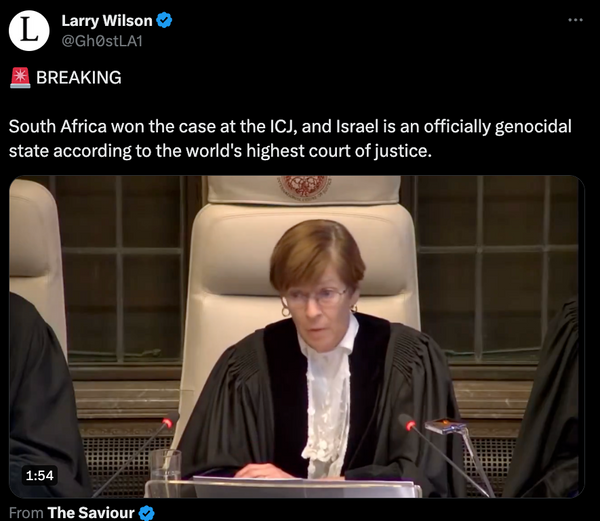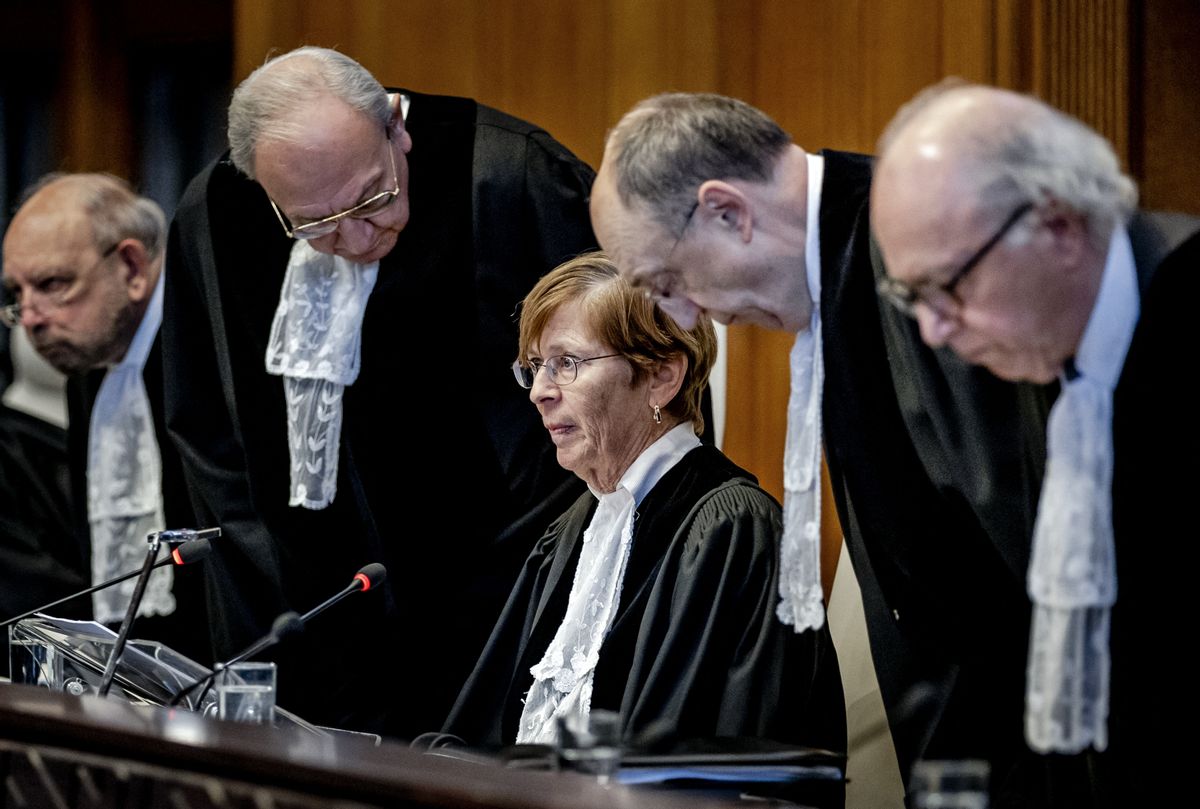The ICJ has not made a final ruling on whether Israel is committing genocide, and it could take years to reach a decision. However, it said some of South Africa's arguments are plausible enough for a case and has ordered Israel to take “all measures within its power” to prevent genocide — including refraining from killing or causing harm to Palestinians, preventing and punishing incitement to genocide, and taking immediate action to allow basic aid to Gaza.
The protracted, often bloody Israeli-Palestinian conflict exploded into a hot war on Oct. 7, 2023, when the militant Palestinian group Hamas launched a deadly attack on Israel and Israel retaliated by bombarding the Gaza Strip. More than 20,000 people, the vast majority of them Palestinians, were reportedly killed during the first two months of the war alone. The violence is driven by mutual hostilities and territorial ambitions dating back more than a century. The internet has become an unofficial front in that war and is rife with misinformation, which Snopes is dedicated to countering with facts and context. You can help. Read the latest fact checks. Submit questionable claims. Become a Snopes Member to support our work. We welcome your participation and feedback.
On Jan. 26, 2024, the International Court of Justice (ICJ) delivered a ruling on emergency measures requested by South Africa over Israel’s ongoing military campaign in the Gaza Strip. Many online erroneously claimed South Africa had therefore “won” the case and that Israel had been declared a “genocidal state” by the court. For example:

(Screenshot via X)
However, South Africa has not officially “won” the case, even though the ICJ ordered nearly all of South Africa’s requested provisional measures to be carried out, with the exception of a cease-fire. The judges have not ruled on the merits of the genocide allegations — and it could take years before they reach a decision.
As such, we rate the above claim as False, with the caveat that the judges agreed with some of South Africa’s arguments in their provisional ruling — that the ICJ had jurisdiction and that South Africa had standing to bring the case — and did not accept Israel’s request to dismiss the case, as there were plausible claims of possible genocidal acts.
The ICJ did not, however, order a cease-fire in Gaza, which was the key request in South Africa’s list of emergency measures.
Earlier in January 2024, South Africa argued that Israel’s actions amounted to genocide against the Palestinian people, noting that more than 23,000 Palestinians had been killed in Israeli operations since October 2023, and asked the court to halt the operations. Israel rejected South Africa’s claims and argued it had the right of self-defense after Hamas’ Oct. 7, 2023, attack, which resulted in the deaths of around 1,200 Israelis, most of whom were civilians.
What Was in the ICJ Order?
Stopping short of ordering a cease-fire, the ICJ’s interim ruling was a series of provisional measures that effectively ordered Israel to comply with the 1948 Genocide Convention. The provisions outlined by ICJ President Joan Donoghue are as follows (summarized by Al Jazeera):
- By 15 votes to 2, the State of Israel shall, in accordance with its obligations under the Convention on the Prevention and Punishment of the Crime of Genocide, in relation to the Palestinians in Gaza, take all measures within its power to prevent the commission of all acts within the scope of the Article 2 of the Convention, in particular, A) killing members of the group, B) causing serious bodily or mental harm to the members of the group, C) deliberately inflicting on the group conditions of life calculated to bring about its physical destruction in whole or in part, and D) imposing measures intended to prevent births within the group.
- By 15 votes to 2, the State of Israel shall ensure, with immediate effect, that its military does not commit any acts described in point 1 above.
- By 16 votes to 1, the State of Israel shall take all measures within its power to prevent and punish the direct and public incitement to commit genocide in relation to members of the Palestinian group in the Gaza Strip.
- By 16 votes to 1, the State of Israel shall take immediate and effective measures to ensure the provision of urgently needed basic services and humanitarian assistance to address the adverse conditions of life faced by Palestinians in the Gaza Strip.
- By 15 votes to 2, the State of Israel shall take effective measures to prevent the destruction and ensure the preservation of evidence related to allegations of acts within the scope of Article 2 and Article 3 of the Convention on the Prevention and Punishment of the Crime of Genocide against members of the Palestinian group in the Gaza Strip.
- By 15 votes to 2, the State of Israel shall submit a report to the court on all measures taken to give effect to this order within one month as from the date of the order.
The full order can be read on the ICJ's website.
David Simon, director of the genocide studies program at Yale University, told Snopes over email that the court stopping short of ordering a cease-fire could be “some unspoken deference to Israel's self-defense argument. What [the court] is trying to say … is ‘we would be overstepping our bounds if we called for the cessation of all military activities, but you have to make sure that nothing you do [constitutes] genocide, or is comprised of acts of genocide.’”
Simon added that the ruling was consistent with provisional measures issued in Gambia v. Myanmar, referring to the 2019 case in which Gambia took Myanmar to the ICJ, accusing it of committing genocide against the Rohingya. In 2020, the court directed Myanmar to "take all measures within its power" to prevent the commission of acts defined in the Genocide Convention. The case is still ongoing.
“In both cases, the ICJ is aware that its jurisdiction is over state compliance with the Genocide Convention, not matters of the criminal liability of individuals,” he said.
Donoghue noted that while the court could not at present make a final determination on whether Israel is guilty of genocide, given the deteriorating situation in Gaza the court had jurisdiction to order measures to protect Gaza's population from further risk of genocide.
Before announcing the decision, Donoghue read statements from Israeli officials that she said made South Africa’s case plausible and gave an assessment of the humanitarian crisis in Gaza. The order called attention to a series of statements made by Israeli leadership — described variously as incitements to genocide and as "dehumanizing" Palestinians by scholars — in particular Defense Minister Yoav Gallant, President Isaac Herzog and Foreign Affairs Minister Israel Katz (then Minister of Energy and Infrastructure when he made the statement). For example, the order stated:
[...] the Court has taken note of a number of statements made by senior Israeli officials. It calls attention, in particular, to the following examples.
52. On 9 October 2023, Mr Yoav Gallant, Defence Minister of Israel, announced that he had ordered a “complete siege” of Gaza City and that there would be “no electricity, no food, no fuel” and that “everything [was] closed”. On the following day, Minister Gallant stated, speaking to Israeli troops on the Gaza border: “I have released all restraints . . . You saw what we are fighting against. We are fighting human animals. This is the ISIS of Gaza. This is what we are fighting against . . . Gaza won’t return to what it was before. There will be no Hamas. We will eliminate everything. If it doesn’t take one day, it will take a week, it will take weeks or even months, we will reach all places.”
Simon told us that the court taking notice of those statements gives credence to South Africa’s arguments of genocidal incitement that we discussed in more detail in our past coverage.
He noted: “That Israel has already announced that it would crack down on incitement suggests that it is aware of its vulnerability to [findings] against it on this matter. A court need not find 'intent to destroy' when asking whether a state has taken sufficient measures to prevent genocide incitement, only that it has been essentially negligent with respect to others within its jurisdiction who may be articulating such intent.”
Crucially, the court found that a number of South Africa’s arguments were plausible, stating:
In the Court's view, the facts and circumstances mentioned above are sufficient to conclude that at least some of the rights claimed by South Africa and for which it is seeking protection are plausible. This is the case with respect to the right of the Palestinians in Gaza to be protected from acts of genocide and related prohibited acts identified in Article III, and the right of South Africa to seek Israel's compliance with the latter's obligations under the Convention.
Is the Ruling Enforceable?
Ultimately, the ICJ cannot force Israel to do anything, as we previously outlined. However, international scrutiny on how Israel characterizes its actions in Gaza will be higher, Simon pointed out.
“Israel will presumably calculate that there is a reputational loss (beyond what it has already absorbed) to making tenuous arguments, so it will want to be able to claim it has taken real measures,” he added.
Because Israel already has argued that it is in compliance with the Genocide Convention, it is unlikely to drastically change course, according to Simon, and South Africa’s “right of rebuttal” will become the forum to adjudicate further genocide claims.
South Africa’s minister for international relations, Naledi Pandor, said that without a cease-fire Israel could not effectively implement the court-ordered measures.
Mahmood Mamdani, professor of government at Columbia University, told Democracy Now!:
It is clear to me that [the ICJ] couldn’t have called directly for a ceasefire without preempting their future deliberations. At the same time, if it walks like a duck, talks like a duck and sounds like a duck, then it’s a duck. Everything they ordered in terms of preventive measures leads to only one conclusion, which is ceasefire. How do you stop killing people? Ceasefire. How do you ensure that supplies for human life get in? Ceasefire. And so on and so forth.
What Are Reactions to the Ruling?
Israeli Prime Minister Benjamin Netanyahu said the ICJ’s willingness to consider the genocide charges was a “mark of shame that will not be erased for generations.” He vowed to continue the war.
“We will continue to do what is necessary to defend our country and defend our people,” he said. “Like every country, Israel has the basic right to defend itself. The court in the Hague rightfully rejected the outrageous request to take that away from us.”
Al Jazeera reported “frustration and resentment” on the part of Palestinians in Gaza in response to a ruling that did not include a cease-fire. People wanted an “end to the madness” and were “waiting for that one statement that could have relieved an entire population largely displaced and, more profoundly, traumatised as the bombing continues across the Gaza Strip,” the news outlet wrote.
Up until the order was announced, bombing continued in the city of Khan Younis and the northern part of the region, according to Al Jazeera.
In sum, the ICJ did not made a final judgment, but issued a number of provisional rulings while finding many of South Africa’s arguments were “plausible” and warranted a case. It did not call for a cease-fire. A definitive judgment will likely take years to come.

